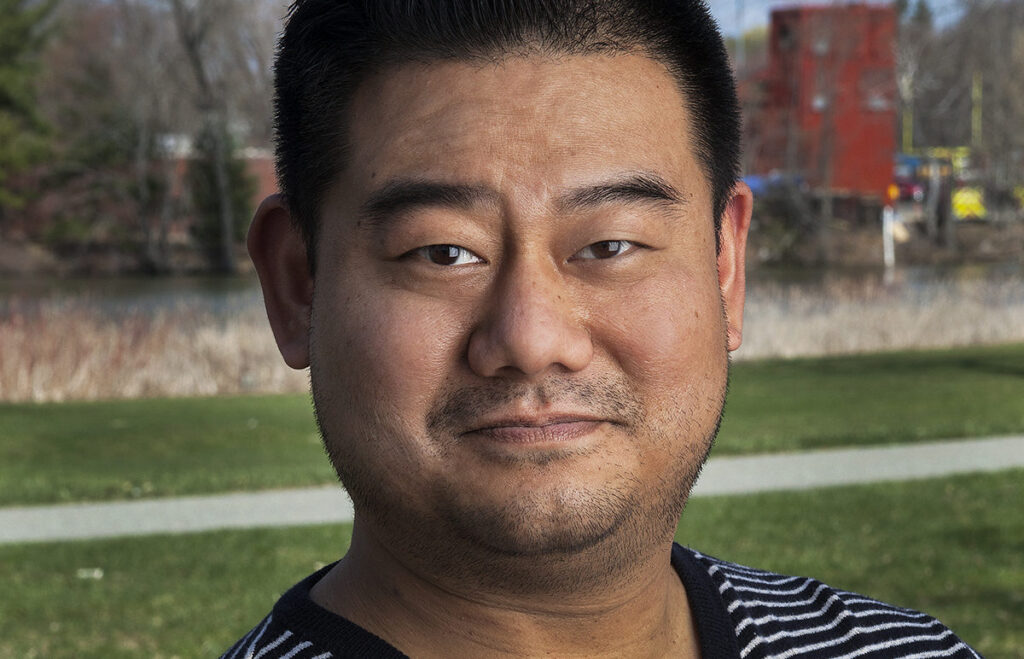Don Vo
Worcester
I enrolled in Clemente at exactly the right time: the year when Eric Garner, Michael Brown and Tamir Rice died at the hands of police officers, the year when Black Lives Matter began to come together.
Although I’d tried college before, it never worked for me. As a student at Holy Cross for two years, taking classes and taking tests did not inspire me. Even the creative writing and reading courses were all just okay. The classes didn’t feel like they had a purpose.
So, when my sister got a Fulbright to work at the Vietnam Friendship Village for children who had been sprayed with agent orange, I went with her. In Ho Chi Minh City, I enrolled in an Australian college with the hope of making a fresh start. But that experience almost made me book a ticket home, because it was just more of the same conventional academic experience.
Instead, I picked up a job teaching English and enjoyed my new liberty, meeting expats and locals. I was that kind of know-it-all American, and I got a rude awakening when one expat advised, “You better accept it as it is here, or else you should go to the consulate and beg for a ticket home–or you’re not going to make it.” Once I took that advice, I ended up living in Vietnam for four years. It was a whole different world with an extremely relaxed atmosphere. You could walk on uncrowded beaches watching the swimmers. People would walk by pushing carts full of street food: deep fried flour cakes topped with eggs and grilled octopus. Gradually I came to realize and appreciate that Vietnam is a very collective society.
When I returned from Vietnam, it was with a much greater consciousness that we have a very individualistic society in America—one that is almost selfish. Maybe that’s one reason I hadn’t really liked college. In a traditional college setting you have a handful of people who participate in class discussions because they know the grade requires it. And, quite frankly, when I’m in a regular college class I’m not sure how much the students can bring to the discussion. I can’t blame them, because they’re fresh out of high school, and many come from affluent families and can’t see beyond their own lives.
Class discussions are always rich because Clemente students bring their extensive life experiences, questions, and emotions into the conversations.
Even so, I enrolled at Assumption College when I returned. My mindset was better but after a year, my Holy Cross loans caught up with me and my financial aid was cut off. It was around then that an old mentor stopped by and gave me a brochure about Clemente. He’s very big on the importance of getting your degree (as am I) and he suggested I try the Clemente program.
When I sat in my Clemente courses, I realized there was a natural level of engagement on the part of the students. Class discussions are always rich, because Clemente students bring their extensive life experiences, questions, and emotions into the conversations. Although I’d spent a long time earlier in my life wanting to leave Worcester, the Clemente students reminded me that I’m glad to be home because the whole world is right here in Worcester. And rather than competing against one another, Clemente students act like they are members of a community.
When Eric Garner and Michael Brown and Tamir Rice died, we talked about those issues in our writing class, and in philosophy, poetry, and history. I still remember how, in week three of the semester, the professors explained that we were venting our emotions and opinions but that we needed to analyze these issues intellectually to see what we could take away. How could history help us understand the situation better and how could poetry help us express our emotions and thoughts? We were still angry, but those discussions helped us think more clearly about how to respond.
Not everyone had that opportunity. There was a lot of violence in the streets at that time. I don’t condone violence, but I think I understand why it happens. Violence happens when people feel they don’t have a voice or a hope of making things better. But Clemente gave us a voice and reasons to be optimistic.
Here’s how Langston Hughes, one of my favorite poets, put it:
What happens to a dream deferred?
Does it dry up
like a raisin in the sun?
Or fester like a sore—
And then run?
Does it stink like rotten meat?
Or crust and sugar over—
like a syrupy sweet?
Maybe it just sags
like a heavy load.
Or does it explode?
John Lewis, another writer I studied in Clemente, offered advice on how to deal with this problem. What he says in Walking with the Wind resonated with me:
“Do not get lost in a sea of despair. Be hopeful, be optimistic. Our struggle is not the struggle of a day, a week, a month, or a year, it is the struggle of a lifetime. Never, ever be afraid to make some noise and get in good trouble, necessary trouble.”
I feel like John Lewis is speaking to me because I can have a somewhat abrasive and brazen personality, and It’s always been easy for me to get discouraged. So, I like it when he says, “Do not get lost in a sea of despair.” Because that’s what despair does. You sink and sink and sink and sink. It is a sea, and the sea is deep. So, I want to remember that. I want to be the better man and make a difference.

